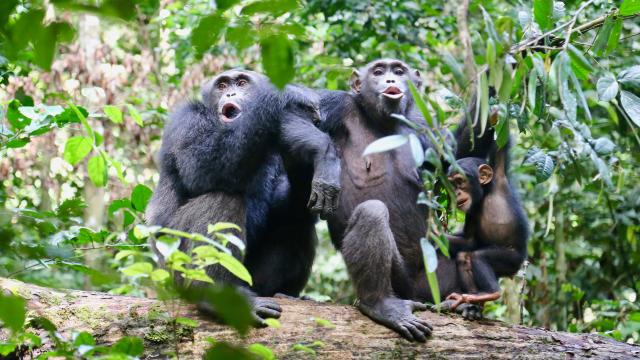We know chimpanzees as intelligent, emotional creatures that make and use tools, grieve for their dead, and pass down traditions between generations. But less well-known is that different communities of chimps have unique cultures—and that behavioural diversity that is shrinking, according to a new, 10-year study of chimpanzee groups in Africa.
The world’s population will hit a staggering 9.7 billion people in 2050, the United Nations estimates, with almost half that growth on the continent of Africa. More humans means the already dire habitat loss experienced by some of Earth’s most vulnerable and endangered species—including our close cousin, the chimpanzee—will only get worse. And the unique cultures created within specific chimpanzee communities could be lost forever.
While humans are often fascinated by both our social and physical similarities to chimpanzees, such as our shared opposable thumbs and tender care for infants, this fascination has done little to actually protect the primates. Threatened by habitat loss, poaching, and disease, today wild chimpanzees can only be found in 21 countries in Africa, and both wild and captive chimpanzees are considered endangered. In addressing these issues, conservationists and primatologists have largely focused on the more easily observed losses of these communities, such population or genetic diversity, but new research from the Max Planck Institute of Evolutionary Anthropology has shed light for the first time on how human activity may result in the loss of chimpanzees’ behavioural and cultural diversity as well.
“When you look at what has been published over the last decade, there’s a lot about biodiversity and species diversity, but not about other levels of diversity,” Hjalmar Kühl, a lead researcher on the paper, senior scientist at the Max Planck Institute of Evolutionary Anthropology, and researcher at the German Centre for Integrative Biodiversity Research, told Gizmodo. “If you want to say anything about behaviour it’s much more difficult.”
Published in Science, the research is the culmination of a 10-year study of 144 chimpanzee communities in parts of Central Africa and its Western Coast. Through non-invasive observations using camera traps, faecal sampling, and tool reconnaissance, the research team was able to identify a significant difference in cultural and behavioural diversity between chimpanzee communities with higher human impact and those with lower. In communities with higher overall human impact, determined by factors such as nearby population density and infrastructure, the research found that these chimpanzees had an 88 per cent lower probability of displaying diverse behaviours or traditions.
These behaviours and traditions, said Kühl, can be grouped into three distinct categories: resource extraction (for example, fishing for termites with a stick), communication, and thermoregulation (i.e. keeping cool, such as by bathing in water). While some of these behaviours are adaptations to the environment, others are unique between individual communities themselves.
“There are some local traditions,” like nut cracking or stone throwing, “that the innovators of specific populations do, but individuals of another population with the same materials available don’t do,” said Kühl.
Kühl said that there is not one clear answer as to why these behaviours would be affected by proximity to humans, but there several possibilities. One explanation is the overall decrease in chimpanzee populations. As has also been demonstrated in humans, an overall decrease in populations can result in a decrease of cultural transmission as well. Kühl also said that habitat depletion, fragmentation, and change as a result of climate change could also contribute to how these communities display certain behaviours—as their environments change, they are unable to carry out environment dependent behaviours.
While a chimpanzee not fishing for algae or not communicating through stone throwing may not sound like a devastating loss to the untrained ear, Kühl said these losses are symptoms of a greater problem.
“It’s not that they are playing around and inventing something just for fun without an underlying purpose,” said Kühl. “Assuming there’s adaptive value for at least some of the behaviour, it also means they have to survive and interface with certain environments, [and] if they lose this behaviour it is possible that it will somehow compromise their long-term survival.”
With this in mind, in addition to conservation efforts that focus on protecting genetic diversity across species of chimpanzees, the researchers propose the creation of “chimpanzee cultural heritage sites” where behavioural and cultural diversity can be recognised and protected as well.
“Chimpanzees are the species with the largest known behaviour repertoire next to humans,” said Kühl, “and cultural heritage sites could help us further promote their conservation.”
